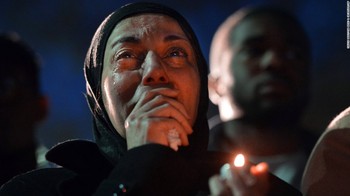It is estimated that over 3.3 million Muslims reside in the United States as of 2015, and that the number is predicted to double by 2050, according to the Pew Research Center (PRC). Though a major component of American idealism is the freedom to practice any religion, when Islam is the choice, America’s acceptance often comes up short.
Terrorism’s entire point is to increase tension. Still, violent terrorist acts continue to be carried out all over the world, including the most recent major attack here in the U.S.: the nightclub shooting in Orlando, Florida, carried by the terrorist group ISIS. These widespread negative representations of Muslims leave many innocent members of this peaceful religion victim to the blame here on American soil.
“New Orleans is a heavily diverse city with a large Muslim community, but just drive 30-45 minutes toward any direction, and the discrimination increases dramatically. I have been working in Slidell for a good month now, and in those 30 days or so I’ve been told to ‘go back to Syria’ (although I’m Palestinian) or similar ignorant statements after I was heard speaking Arabic with my business partner,” said junior Rabee Hindi.
“As an American Muslim, acts of terror affect me in many negative ways. I watch the news almost every day, and I cringe every time I hear the word ‘explosion,’ ‘terror,’ ‘shooting’ or ‘bomb.’ Whenever I hear these words I have to be ready to defend myself from the verbal abuse, harassment, and discrimination that will come from people who are my neighbors and peers,” said junior Hanan Hinnawi.
From its side, Sophomore Rokaya Gharib said, “A lot of people, believe it or not, are prejudiced, especially in the airport. With TSA, when I go into security, the alarms don’t go off, but they still double check me; and I thought they do that to everyone because I’m so used to them doing it to me, but I look around, and they don’t do that to anybody else.”
“People in the streets are very prejudiced. Like one time I was out during Mardi Gras, uptown, with my best friend, and I was just walking in the crowd, and this one boy yelled out that I had a bomb on me because I had a backpack on,” Gharib added.
This attitude isn’t only taken on by everyday people in everyday situations; Presidential candidate Donald Trump has expressed the same sentiments.
During a speech he gave on June 13 in Manchester, New Hampshire, Trump said, “When I’m elected, I will suspend immigration from areas of the world where there’s a proven history of terrorism against the United States, Europe or our allies, until we fully understand how to end these threats.” In a previous speech, he blatantly called for a “complete and total shut down of Muslims entering the United States.”
“This bothers me because he’s saying it, and everyone’s watching; it’s on TV, it’s viral, so when he says that…it’s affecting all Muslims, and it just makes us seem really bad, and it makes it worse for us,” said Gharib.
Hinnawi said, “Donald Trump is a disgrace to America. America is a melting pot; we have different religions, cultures and skin colors that make this country beautiful.
The fact that he has even stayed in the running for president is absurd…I am still confused why someone would even think he is fit to run for president. This man is delusional. He is playing with fire, and if he gets elected, we will get burned. He is making remarks about Muslims and without consideration. He doesn’t understand that he will be losing support from many foreign allies.”
“I’m not only a Muslim living in America; I’m an American-born citizen that loves this country. He doesn’t understand that if any threat hits our shores, me and the majority of Muslims in this country will be the first to strap their boots and defend this great, free nation,” said Hindi.
Gharib expressed what both Hinnawi and Hindi both ultimately felt. She said, “I just want to be equal…I think that people just need to learn more about the religion and stop stereotyping because a lot of people don’t know anything about Islam, and it’s a shame.”
 Mouood Mouood English Edition
Mouood Mouood English Edition




